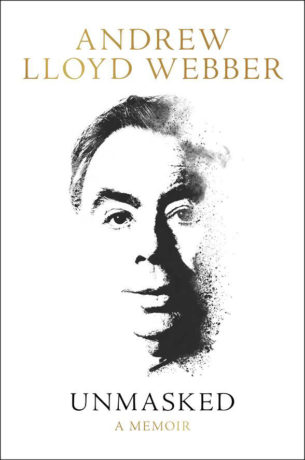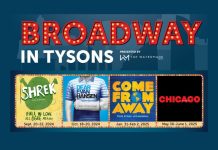One sunny afternoon in 1984, Andrew Lloyd Webber (not yet “Sir Andrew Lloyd Webber” or “Baron Lloyd-Webber of Sydmonton” as he is known today) paid 50 cents for a used copy of Gaston Leroux’s The Phantom of the Opera that he found at a bookstall on Fifth Avenue.
That purchase would prove fateful – for himself and for the “wondrous little corner of show business called musical theatre.”

In town for rehearsals of his Requiem and with free time on his hands, the 36-year-old British composer holed up in the Ritz-Carlton to read Leroux’s “penny dreadful.” That night he had an epiphany. Here was the plot he could fashion into the “high romance” he’d always yearned to write, ever since dropping out of Oxford to work on Joseph and the Amazing Technicolor Dreamcoat with lyricist pal Tim Rice.
By the time he returned to London, Lloyd Webber even thought of his own plot twist designed for maximum theatricality: The Phantom writes his own opera for his beloved Christine Daaé to perform. During its performance, the Phantom assumes the lead opposite her for himself. During their passionate duet, Christine unmasks him in front of the entire opera house and he flees the stage in shame.
It is fitting that Webber, now aged 70, titles his new autobiography Unmasked, in tribute to the musical that “changed the fortunes of everyone in involved.”
It is perhaps hyperbolic to say that Lloyd Webber unmasks himself in this book. There are times when he seems like the narrator of Joseph or Evita, cold, aloof and distant from the people who populate his life story (Unmasked features cameos from numerous celebrities, including Elaine Paige, Sarah Brightman, with whom he shared a rocky marriage, Mandy Patinkin, Patti LuPone, Lorin Maazel, Milos Forman, Placido Domingo, Barbra Streisand and Michael Crawford).
But there is a moment, early on in Unmasked, that is raw and personal and offers critical insight into the way the composer sees himself and his musical mission.
“I have one vivid memory of Dad,” he writes of his father, William, the director of the London College of Music. “Before we went to the movie of South Pacific, he played me the Mario Lanza recording of “Some Enchanted Evening.” Three times he played it, tears streaming from his eyes. … When the record finally stopped he looked me straight in the face. ‘Andrew,’ he said, ‘if you ever write a tune half as good as this I shall be very, very proud of you.’”
The young Lloyd Webber “went to bed heady with melody,” the incident imparting a message that would stay with him for life.
Critics like The New York Times’ Frank Rich have derided Lloyd Webber’s “Puccini-isms,” but here Lloyd Webber embraces his identity as the master of melody. Unmasked makes the case that his career has been one long, continuous effort to achieve a tune worthy of Richard Rodgers and of his father’s approbation.
It’s this striving and self-doubt that redeems Unmasked from moments of outrageous snobbishness (the composer, we learn, was once forced to subsist on a diet of caviar on a transatlantic voyage because the Cunard Line’s culinary offerings were so subpar, poor thing) and rehabilitates Lloyd Webber’s reputation for arrogance.
OK, maybe not entirely. There’s one scene in which he admonishes Barbra Streisand that “most artists kneel” when recording his music but given how funny he is throughout most of this book, I wonder whether this line wasn’t delivered with tongue firmly in cheek.
In another scene, the elegant actor Michael Crawford, Broadway’s original Phantom, challenges producer Cameron Mackintosh to a fist fight in the middle of a busy British highway (Crawford wanted to pre-tape his big Act II number “The Point of No Return” for fear of sounding muffled by his mask).
Where Webber comes off as considerably less charming is in his discussion – loudly and often – of money. He has a mind for business, that is self-evident. After reigning over the musical theatre world for nearly five decades, he has amassed a reported fortune of more than £700 million (roughly $1 billion), scooped up several of London’s premiere theaters, including the historic Palace Theatre, restored a country house outside of London to rival Downton Abbey and accumulated a famous collection of Pre-Raphaelite art.
But whereas an early section of the book devoted to explaining the “music business facts of life” is helpful and informative, his interminable interludes about splits, remissions and Grand Rights eventually become tedious. A writer must always be aware of his or her audience, and I suspect the audience for this book came for “Music of the Night,” not “And the Money Kept Rolling in (and Out).”
But these flaws do not prove fatal to Lloyd Webber’s autobiography. There are enough anecdotes, gossip, humor and history to satisfy, as Lloyd Webber shares his recollections of how his most famous works came to be – from his first hit, Joseph and the Amazing Technicolor Dreamcoat; to the rock opera Jesus Christ Superstar (scheduled to be performed live on NBC this weekend); to the Tony Award-winning Evita; to Cats and finally The Phantom of the Opera.
At the first preview of Phantom in New York, he tells us, “I vividly remember ‘The Point of No Return’ being rammed with sexual tension and the audience gasped when Sarah ripped off Michael’s mask. However cloying it reads, I was crying at my own music during the last scene.”
This point is important. He knows that he writes heart-on-sleeve melody and isn’t embarrassed. He must be true to himself.
One of the most memorable exchanges in Unmasked is on point here. Lloyd Webber recounts how, one afternoon in 1985, he asked the legendary conductor Lorin Maazel to explain the appeal of minimalism and its principal exponent Philip Glass. When Webber’s eyes began to glaze over, Maazel remarked, “Andrew, there’s no point in my explaining this. You’re a maximalist.”
Phantom became the most commercially successful musical of his career and arguably the most successful entertainment of all time, “if you inflation-adjust the total,” which, of course, he has. It’s been performed in 166 cities and the original production is still running on Broadway.
It’s on this triumphant note that Lloyd Webber suddenly brings down the curtain on his autobiography. He blames his own verbosity for running out of space to tackle his post-Phantom career, but that explanation is utterly unconvincing.
His next Broadway outing, Aspects of Love, about a bunch of libertines sipping Champagne and changing romantic partners in a villa in the Pyrenees, was a critical and commercial failure of the Carrie and Moose Murders sort. And although Sunset Boulevard contains his most complex score and garnered some of his best reviews, it was not a money maker.
He simply doesn’t have it in him to end on an ambiguous note. He is not Sondheim.
At the end of the day, Andrew Lloyd Webber’s got to be Andrew Lloyd Webber.




